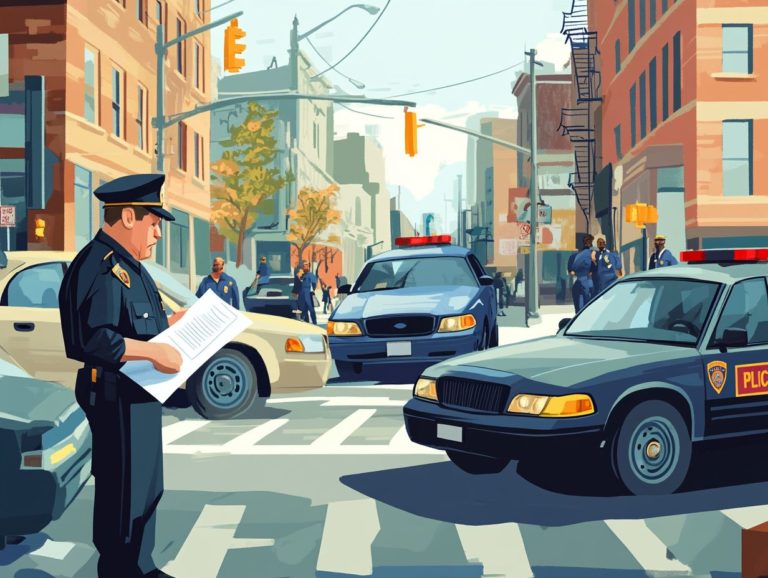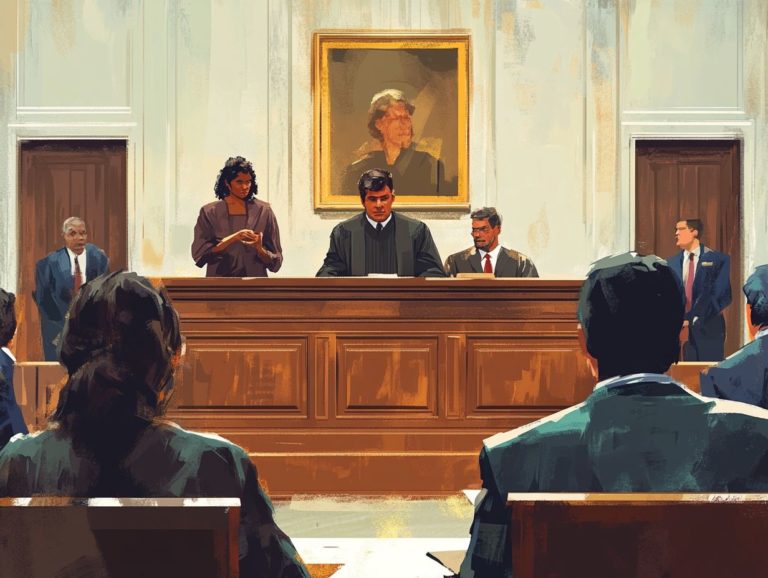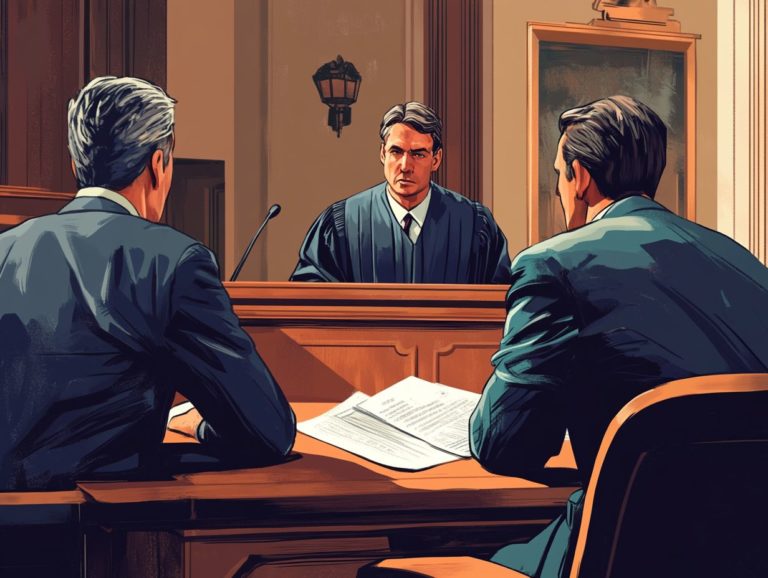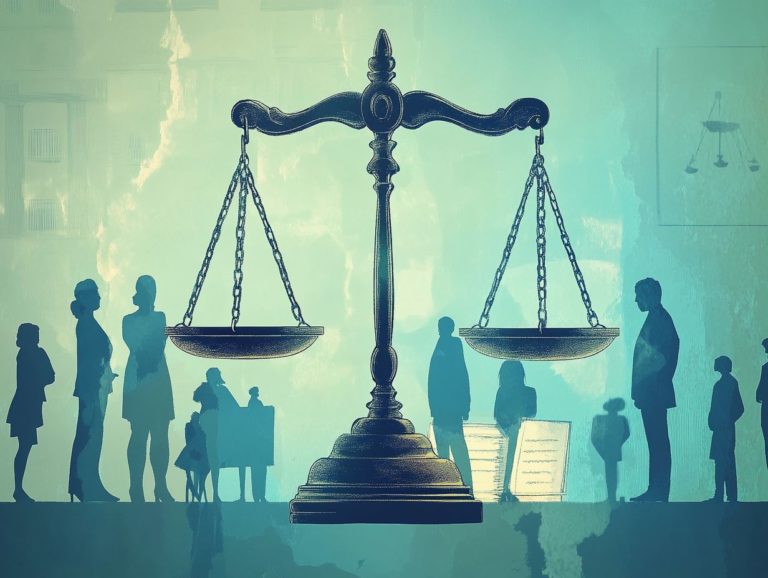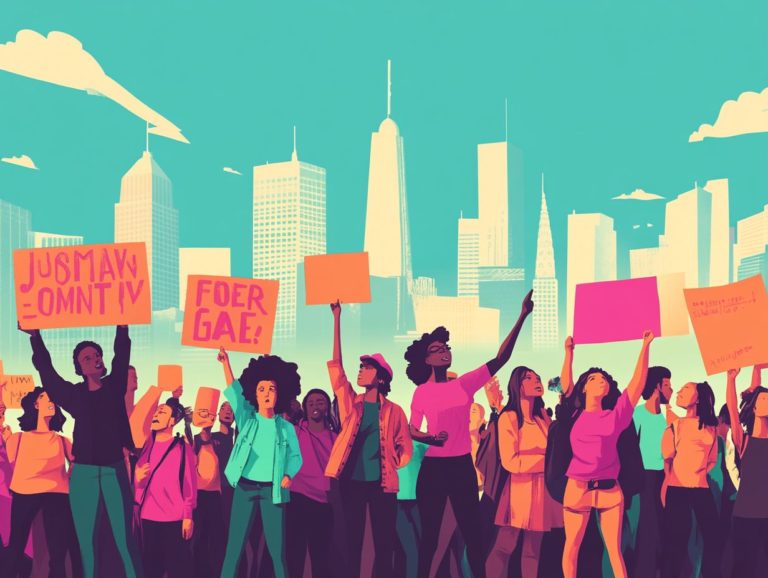10 Rights You Didn’t Know You Had
Human rights are essential entitlements that protect your dignity, freedom, and well-being. Yet, you may not fully grasp the breadth of these rights or how they show up in your everyday life.
Get ready to discover ten crucial rights you might not know you have, ranging from the right to privacy and free speech to your access to healthcare and education. This article also looks at the origins of these rights, the mechanisms in place to protect them, and what you can do to advocate for their enforcement.
Discover how these rights shape your reality and empower you to stand up for yourself and those around you.
Contents
- Key Takeaways:
- 1. Right to Privacy
- 2. Right to a Fair Trial
- 3. Right to Free Speech
- 4. Right to Education
- 5. Right to Protest
- 6. Right to Equal Pay
- 7. Right to Access Public Information
- 8. Right to a Safe Work Environment
- 9. Right to Adequate Healthcare
- 10. Right to Vote
- What Are Human Rights and Where Do They Come From?
Key Takeaways:
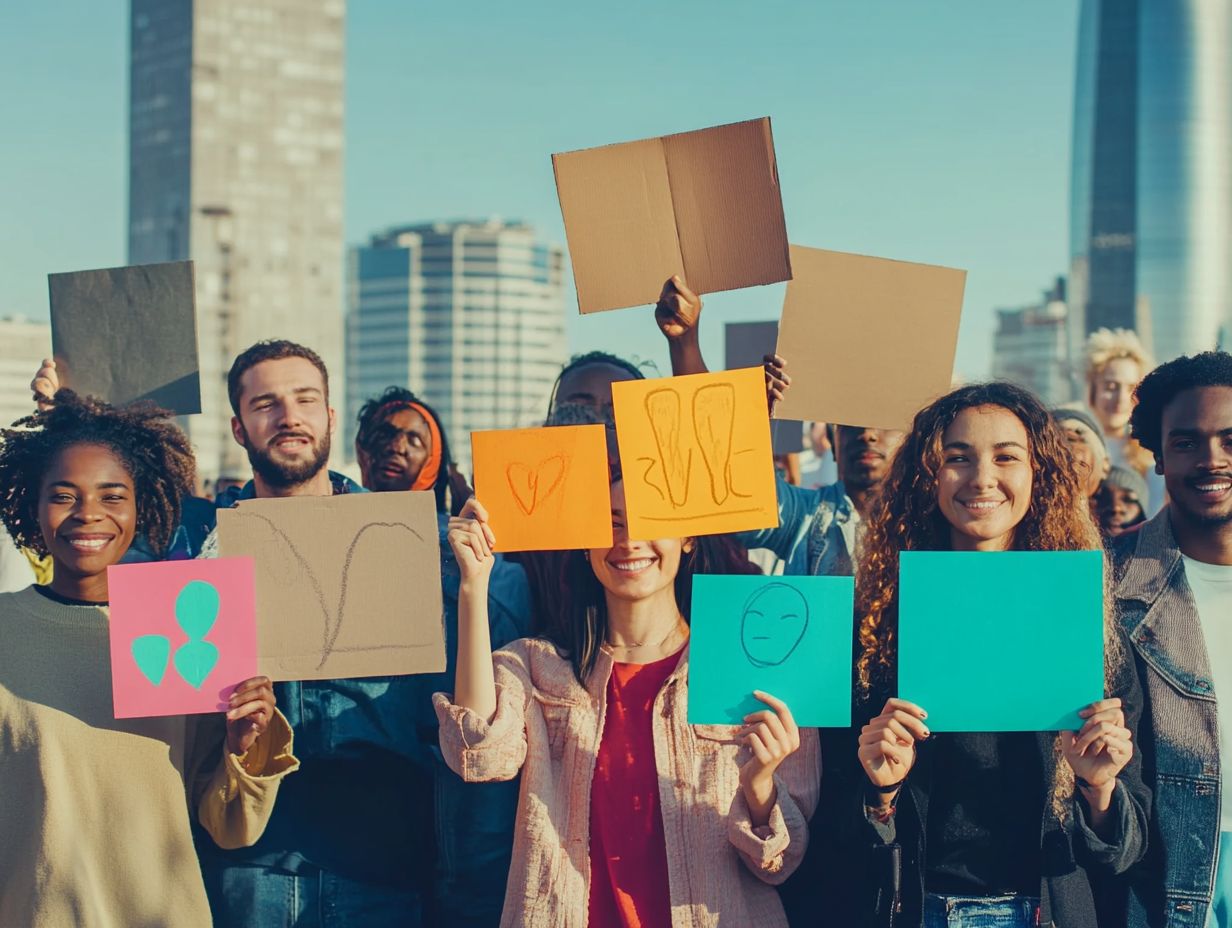
Privacy is a fundamental right that protects individuals from unwarranted intrusion and surveillance.
Everyone has the right to a fair trial, including a presumption of innocence and access to legal representation.
The right to free speech allows individuals to express their opinions and beliefs without fear of censorship or punishment.
1. Right to Privacy
The right to privacy is a cornerstone of legal rights, ensuring you are protected from unwarranted intrusion by law enforcement and other entities. This right includes protections like the requirement of a search warrant and safeguards against self-incrimination under the Fifth Amendment.
These elements are vital for balancing societal safety and personal liberties. Search warrants, which require probable cause, act as a barrier, preventing law enforcement from invading your personal space without justification. This protection enhances transparency and builds public trust in the justice system.
Self-incrimination protections mean you cannot be forced to provide evidence that could harm your case during legal proceedings.
Together, these rights create a strong framework that supports the belief that privacy is essential to the dignity and autonomy of every citizen.
2. Right to a Fair Trial
The right to a fair trial is crucial for your criminal defense and legal rights, ensuring you are treated justly when facing charges. This means you have access to proper representation and a transparent judicial process that upholds the rights protected by the Fifth Amendment.
This fundamental right has several essential components that safeguard your freedoms. At its core is the idea that you are innocent until proven guilty, promoting a thorough evaluation of the evidence against you.
Access to legal counsel is essential, helping you navigate the law and effectively represent your interests. The inclusion of juries adds accountability, as a group of your peers deliberates on the case, ensuring that the verdict reflects a broader societal perspective.
Together, these elements work to uphold justice, balancing the scales for both the accused and law enforcement.
3. Right to Free Speech
The right to free speech is a vital legal safeguard that lets you express your thoughts and opinions without fear of discrimination or retaliation from law enforcement or government entities. This freedom helps many different opinions to be heard.
In situations like protests or public demonstrations, this right is especially important. You gather with fellow citizens to voice dissent against perceived injustices or oppressive actions. These expressions not only highlight individual viewpoints but also reflect the collective consciousness of society.
While there are protections for these rights, it’s crucial to maintain a balance between public safety and allowing for vigorous expression. Each protest prompts discussions about where security measures end and the freedom to speak begins, sparking ongoing conversations about acceptable speech boundaries in a thriving democracy.
4. Right to Education
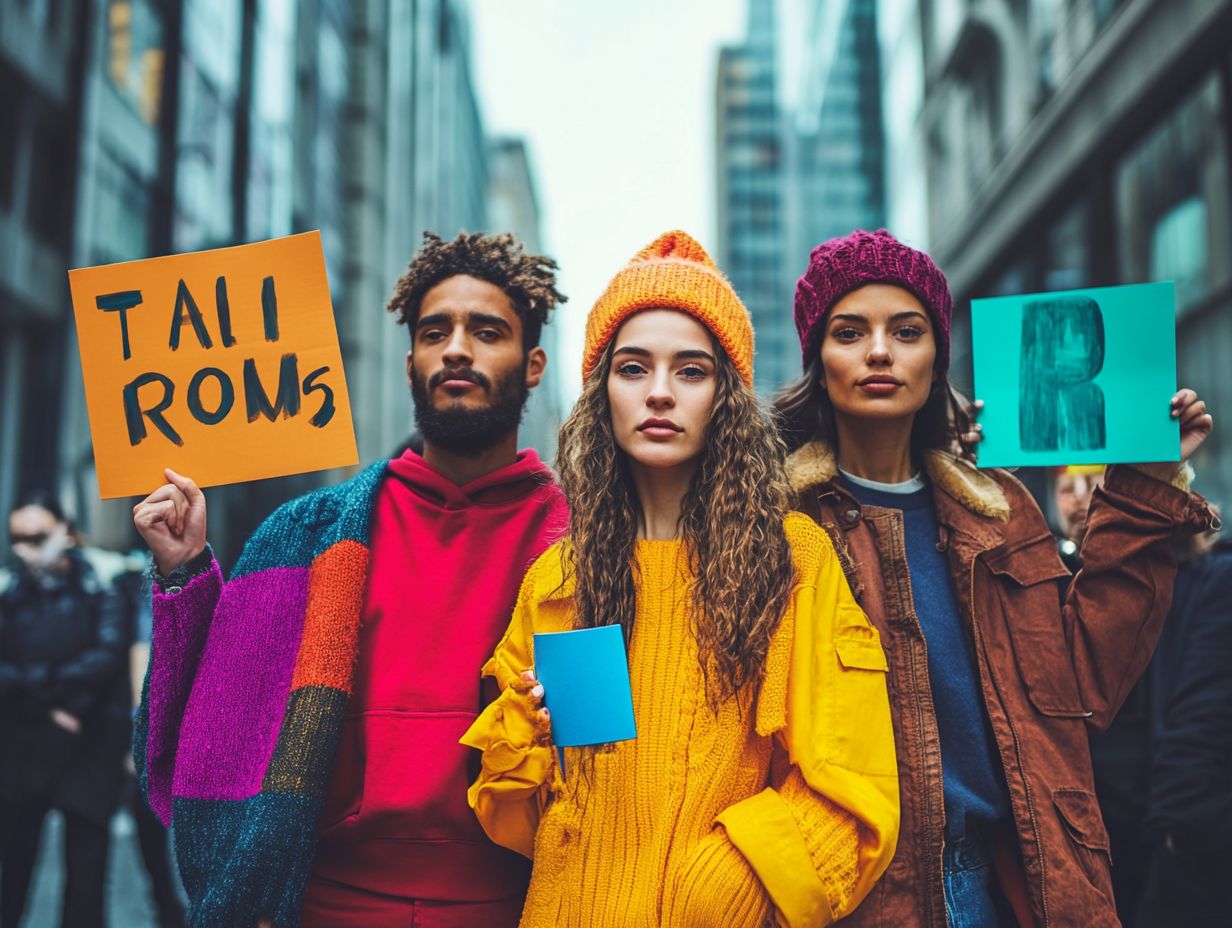
Education is your key to a brighter future. It opens doors to opportunities and helps fight inequality. The right to education is fundamental in promoting equality and fighting discrimination, ensuring that you, regardless of your background, have access to quality educational opportunities that support your physical and mental well-being.
This essential aspect significantly influences workplace dynamics. Educated individuals are more equipped to understand their rights and advocate effectively for themselves. However, barriers such as socioeconomic status, cultural biases, and inadequate resources can obstruct your access to education, perpetuating inequality.
Strong laws, including anti-discrimination laws, are crucial for protecting educational environments. They allow you and others from diverse backgrounds to acquire the knowledge you need without facing prejudice.
By enabling employees through education, you enhance your professional prospects and contribute to a healthier workplace, creating lasting benefits for both individuals and organizations alike.
5. Right to Protest
The right to protest stands as a vital legal protection, enabling you to voice dissent against injustices and discrimination. In these moments, the presence and authority of law enforcement come into play. They are tasked with the challenging duty of maintaining order while respecting your rights.
This delicate balance is crucial. It underscores the role of laws that protect your freedom while defining the responsibilities and limitations of police intervention during gatherings.
As tensions can sometimes escalate, understanding the regulatory landscape enables you as an activist and informs your strategies. This knowledge ensures that your voice is heard without unnecessary confrontation, allowing you to advocate effectively for change.
6. Right to Equal Pay
The right to equal pay for equal work is a fundamental principle that aims to eliminate wage discrimination. It ensures you receive fair compensation no matter your gender, race, or background. It also tackles crucial issues like minimum wage and overtime pay.
This essential principle not only uplifts marginalized groups but also cultivates a more equitable workplace environment.
By closely examining the legislation surrounding equal pay, you can appreciate the vital role minimum wage laws play in this framework. These laws are designed to set the lowest amount employers can pay their workers and shape how various organizations structure their pay scales.
When fair compensation practices are implemented correctly, they serve as powerful tools in the fight against workplace discrimination. This allows you, as an employee, to feel genuinely valued and respected for your contributions, ultimately leading to heightened productivity and morale.
7. Right to Access Public Information
The right to access public information is a crucial legal safeguard that enables you to stay informed about governmental actions and decisions. It fosters transparency and accountability while aiding in the fight against discrimination and injustice.
Accessing information enlightens you about your rights and equips you with the necessary tools to challenge inequities in public services. When communities like yours look closely at available information, they uncover disparities that may exist in critical areas such as education, healthcare, and law enforcement.
This scrutiny plays a vital role in holding public officials accountable, ensuring that everyone, regardless of their background, receives the fair treatment they deserve.
When underrepresented groups understand how to access and utilize public information, they can advocate more effectively for their needs, driving systemic changes that promote equality and protect against discrimination.
8. Right to a Safe Work Environment
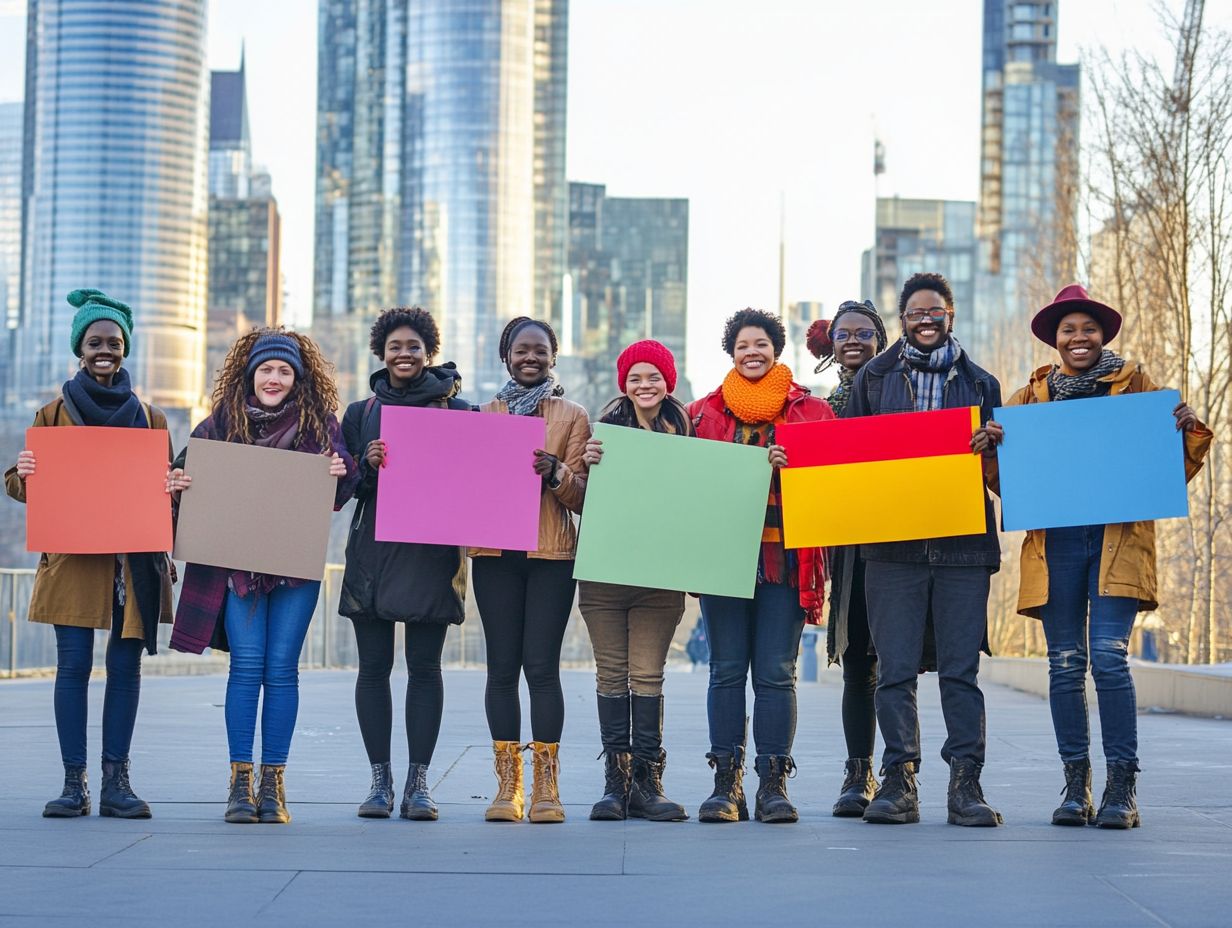
The right to a safe work environment ensures conditions that support your well-being and productivity. You should be free from discrimination and hazards that might jeopardize your health.
This principle is backed by laws that require employers to follow safety protocols and conduct risk assessments. Employers must also educate their teams about potential hazards and best safety practices.
A culture of transparency is crucial. In such an environment, you should feel empowered to voice concerns without fear of retaliation.
9. Right to Adequate Healthcare
The right to adequate healthcare is a fundamental employee right. It ensures you have access to necessary medical services while keeping your medical records confidential.
This right helps prevent discrimination in healthcare access. It s especially important in the workplace, where you might face biases when seeking care.
Upholding these rights creates a secure atmosphere for you and your colleagues. It ensures that your medical information remains private and is not used against you.
Addressing discrimination in healthcare is essential for promoting equal treatment among all employees, regardless of their background or health status.
This commitment fosters a healthier workforce and significantly enhances overall productivity.
10. Right to Vote
The right to vote is essential for democratic participation. It allows you to engage in the electoral process while combating discrimination that may hinder your voting access.
Historically, the fight for voting rights has seen significant milestones. These include suffrage movements for women s rights and civil rights struggles against racial discrimination.
Today, barriers still exist, such as strict ID requirements and limited polling places. These disproportionately affect marginalized groups.
Legal protections exist to shield individuals from discriminatory practices and ensure equitable access to the ballot. Every vote counts in shaping the future.
What Are Human Rights and Where Do They Come From?
Human rights are fundamental freedoms and protections for every individual. They arise from legal frameworks and societal norms that shape your interactions with law enforcement and your understanding of employee rights.
These rights have evolved through pivotal events like the Magna Carta and the Universal Declaration of Human Rights. Each milestone highlights dignity and equality.
Understanding these origins helps you navigate your relationship with authorities more effectively. This knowledge empowers you to advocate for fair treatment and humane practices.
How Are Human Rights Protected and Enforced?
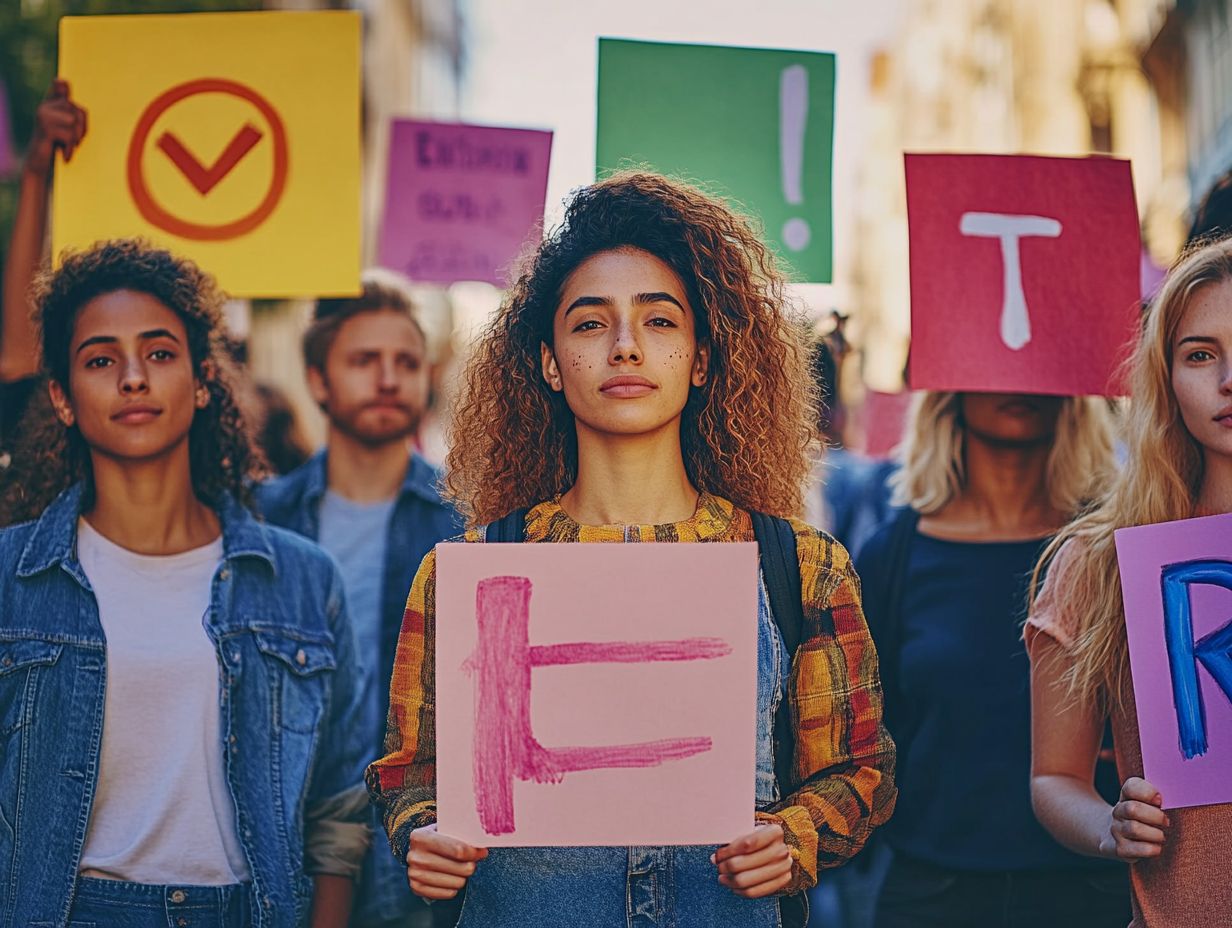
Human rights are safeguarded and enforced through a combination of laws and community efforts. These mechanisms protect individual freedoms and ensure fair treatment for everyone.
Government organizations create policies to prevent violations. Non-governmental organizations monitor abuses and support affected individuals.
Advocacy efforts also raise public awareness and champion reforms, enabling communities to demand accountability and justice. Through collaboration, these entities unite to create an environment where human rights are actively upheld.
What Are Some Examples of Human Rights Violations?
Human rights violations can take many forms, often stemming from law enforcement actions or discriminatory practices that encroach upon employee rights. This highlights the need for legal recourse and heightened societal awareness.
Consider the impact of racial profiling by police, which can lead to wrongful arrests and disrupt the lives of innocent individuals. Such systemic injustices foster a pervasive climate of fear within communities and inflict long-lasting psychological trauma on victims.
Discriminatory hiring practices, whether stemming from age or gender bias, block qualified individuals from seizing opportunities. This perpetuates economic disparities and social inequality.
When you and your community become aware of these critical issues and advocate for change, it reinforces the importance of holding authorities accountable. This collective effort nurtures a society that genuinely values the dignity and rights of every individual.
How Can Individuals Advocate for Their Rights?
Take action now! Advocate for your rights through legal action, community organizing, and raising awareness about employee rights and discrimination issues that impact your life and the lives of others.
By participating in local organizations focused on social justice, you ll gain valuable insights and support. Joining campaigns aimed at reforming workplace policies can amplify your voice and foster a strong sense of community.
Utilizing legal resources, such as consulting with attorneys specializing in employment law or seeking help from advocacy groups, provides crucial guidance as you navigate complex grievances. Attending workshops will equip you with knowledge to confront injustices and inspire meaningful change in your community.
What Are the Limitations of Human Rights?
While human rights are fundamental, it’s essential to recognize that certain limitations exist, often tied to law enforcement practices. Balancing these rights with public safety, alongside concerns about discrimination, can be challenging.
This balancing act has given rise to various legal precedents previous court decisions that guide how laws are applied that outline acceptable boundaries of enforcement. Ongoing debates about the scope of rights often surface during national crises or when addressing issues like terrorism.
Critics argue that excessive limitations threaten the very rights laws are designed to protect. Proponents contend that such measures are vital for ensuring societal safety.
Situations involving refugees or specific police practices illustrate the complex relationship between maintaining order and upholding individual freedoms, creating an environment charged with legal challenges and public discourse.
Join a local advocacy group today and make your voice heard!
How Can We Ensure That Everyone’s Rights Are Respected?
Ensuring that everyone’s rights are respected requires a multifaceted approach. This includes strong legal protections, active advocacy against discrimination, and thorough education on employee rights and societal responsibilities.
Educational institutions play a pivotal role in this mission. They serve as vital platforms where you can learn about your rights and the importance of civic engagement (which means participating in your community).
By incorporating rights awareness into their curricula, these institutions not only equip you with essential knowledge but also foster a sense of accountability toward your community.
Community engagement initiatives boost these efforts by encouraging collaboration and dialogue among diverse groups. Through workshops, seminars, and outreach programs, you can raise awareness and empower yourself and others to advocate for your rights.
Together, we can create a culture that passionately values and protects everyone’s rights!
Frequently Asked Questions
What are the 10 rights you didn’t know you had?
The 10 rights you didn’t know you had are:
- The right to privacy
- The right to free speech
- The right to education
- The right to a fair trial
- The right to a safe workplace
- The right to religious freedom
- The right to peaceful protest
- The right to access public information
- The right to equality
- The right to adequate healthcare
Why is it important to know these 10 rights?
Knowing your rights is crucial because it allows you to protect yourself and assert your freedoms when necessary. Familiarizing yourself with 5 things you must know about your rights can help prevent situations where you might be taken advantage of or unable to defend yourself effectively.
What is the right to privacy?
The right to privacy is the right to be free from intrusion or surveillance by the government or other entities without a valid reason. This includes protection of personal information, space, and possessions.
Do these rights apply to everyone?
Yes, these rights apply to everyone, regardless of their race, gender, age, religion, or any other factor. They are considered fundamental human rights and are protected by law.
What can I do if my rights are violated?
If you believe your rights have been violated, you can seek legal assistance and file a complaint with the appropriate authorities. It is important to document any evidence and gather witnesses to support your case.
Are there any other rights I should know about?
Yes, there are many other rights that may vary depending on your country or region. It is important to educate yourself on the 7 common misconceptions about your rights that pertain to your specific location to fully understand your rights as a citizen.
To learn more about your rights or take specific actions, consider reaching out to local advocacy groups or educational resources!

